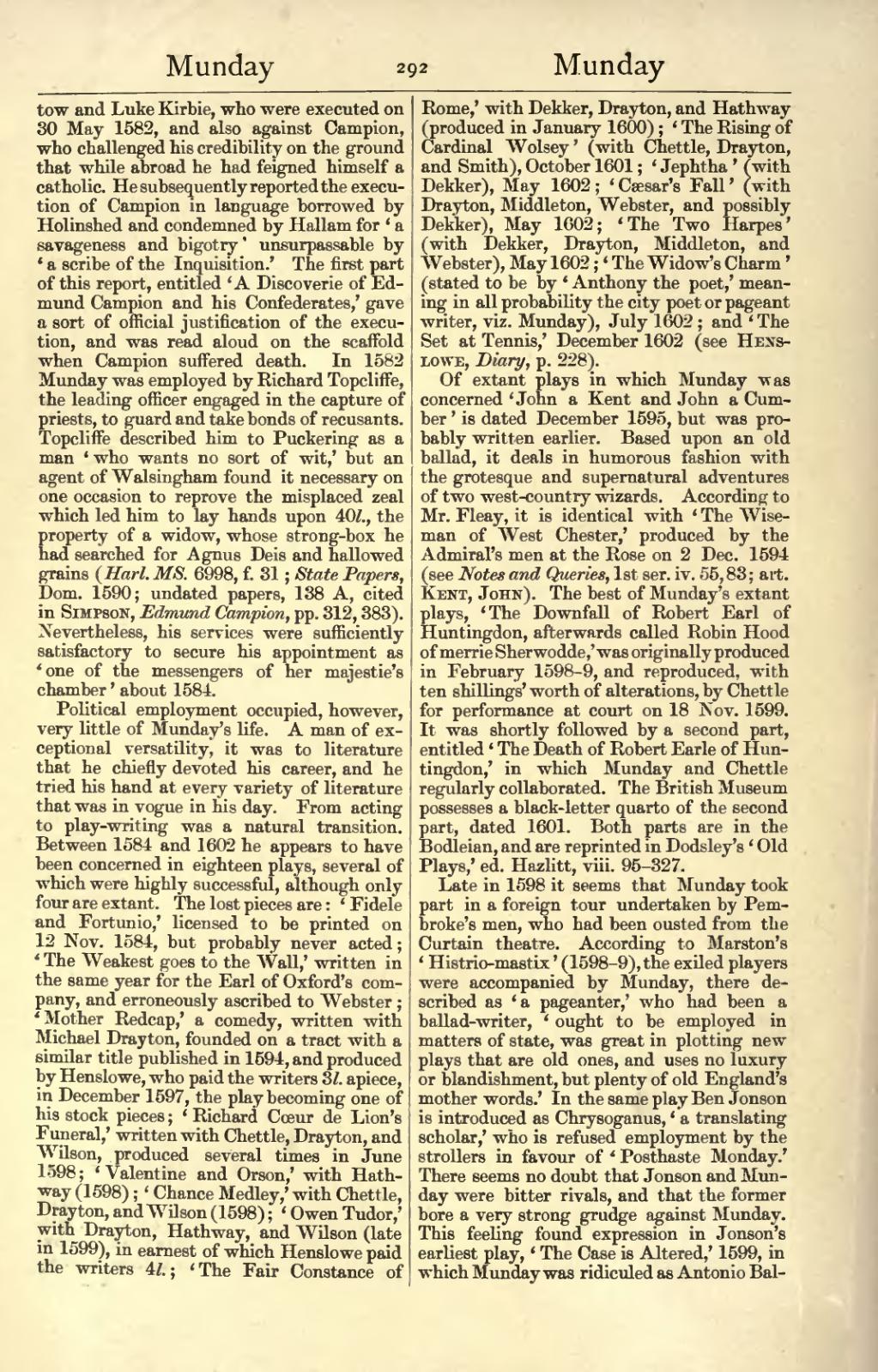tow and Luke Kirbie, who were executed on 30 May 1582, and also against Campion, who challenged his credibility on the ground that while abroad he had feigned himself a catholic. He subsequently reported the execution of Campion in language borrowed by Holinshed and condemned by Hallam for ‘a savageness and bigotry’ unsurpassable by ‘a scribe of the Inquisition.’ The first part of this report, entitled ‘A Discoverie of Edmund Campion and his Confederates,’ gave a sort of official justification of the execution, and was read aloud on the scaffold when Campion suffered death. In 1582 Munday was employed by Richard Topcliffe, the leading officer engaged in the capture of priests, to guard and take bonds of recusants. Topcliffe described him to Puckering as a man ‘who wants no sort of wit,’ but an agent of Walsingham found it necessary on one occasion to reprove the misplaced zeal which led him to lay hands upon 40l., the property of a widow, whose strong-box he had searched for Agnus Deis and hallowed grains (Harl. MS. 6998, f. 31; State Papers, Dom. 1590; undated papers, 138 A, cited in Simpson, Edmund Campion, pp. 312, 383). Nevertheless, his services were sufficiently satisfactory to secure his appointment as ‘one of the messengers of her majestie's chamber’ about 1584.
Political employment occupied, however, very little of Munday's life. A man of exceptional versatility, it was to literature that he chiefly devoted his career, and he tried his hand at every variety of literature that was in vogue in his day. From acting to play-writing was a natural transition. Between 1584 and 1602 he appears to have been concerned in eighteen plays, several of which were highly successful, although only four are extant. The lost pieces are: ‘Fidele and Fortunio,’ licensed to be printed on 12 Nov. 1584, but probably never acted; ‘The Weakest goes to the Wall,’ written in the same year for the Earl of Oxford's company, and erroneously ascribed to Webster; ‘Mother Redcap,’ a comedy, written with Michael Drayton, founded on a tract with a similar title published in 1594, and produced by Henslowe, who paid the writers 3l. apiece, in December 1597, the play becoming one of his stock pieces; ‘Richard Cœur de Lion's Funeral,’ written with Chettle, Drayton, and Wilson, produced several times in June 1598; ‘Valentine and Orson,’ with Hathway (1598); ‘Chance Medley,’ with Chettle, Drayton, and Wilson (1598); ‘Owen Tudor,’ with Drayton, Hathway, and Wilson (late in 1599), in earnest of which Henslowe paid the writers 4l.; 'The Fair Constance of Rome,’ with Dekker, Drayton, and Hathway (produced in January 1600); ‘The Rising of Cardinal Wolsey’ (with Chettle, Drayton, and Smith), October 1601; ‘Jephtha’ (with Dekker), May 1602; ‘Cæsar's Fall’ (with Drayton, Middleton, Webster, and possibly Dekker), May 1602; ‘The Two Harpes’ (with Dekker, Drayton, Middleton, and Webster), May 1602; ‘The Widow's Charm’ (stated to be by ‘Anthony the poet,’ meaning in all probability the city poet or pageant writer, viz. Munday), July 1602; and ‘The Set at Tennis,’ December 1602 (see Henslow, Diary,p. 228).
Of extant plays in which Munday was concerned ‘John a Kent and John a Cumber’ is dated December 1595, but was probably written earlier. Based upon an old ballad, it deals in humorous fashion with the grotesque and supernatural adventures of two west-country wizards. According to Mr. Fleay, it is identical with ‘The Wiseman of West Chester,’ produced by the Admiral's men at the Rose on 2 Dec. 1594 (see Notes and Queries, 1st ser. iv. 55, 83; art. Kent, John). The best of Munday's extant plays, ‘The Downfall of Robert Earl of Huntingdon, afterwards called Robin Hood of merrie Sherwodde,’ was originally produced in February 1598-9, and reproduced, with ten shillings' worth of alterations, by Chettle for performance at court on 18 Nov. 1599. It was shortly followed by a second part, entitled ‘The Death of Robert Earle of Huntingdon,’ in which Munday and Chettle regularly collaborated. The British Museum possesses a black-letter quarto of the second part, dated 1601. Both parts are in the Bodleian, and are reprinted in Dodsley's ‘Old Plays,’ ed. Hazlitt, viii. 95-327.
Late in 1598 it seems that Munday took part in a foreign tour undertaken by Pembroke's men, who had been ousted from the Curtain theatre. According to Marston's ‘Histrio-mastix’ (1598-9),the exiled players were accompanied by Munday, there described as ‘a pageanter,’ who had been a ballad-writer, ‘ought to be employed in matters of state, was great in plotting new plays that are old ones, and uses no luxury or blandishment, but plenty of old England's mother words.’ In the same play Ben Jonson is introduced as Chrysoganus, ‘a translating scholar,’ who is refused employment by the strollers in favour of ‘Posthaste Monday.’ There seems no doubt that Jonson and Munday were bitter rivals, and that the former bore a very strong grudge against Munday. This feeling found expression in Jonson's earliest play, ‘The Case is Altered,’ 1599, in which Munday was ridiculed as Antonio Bal-
